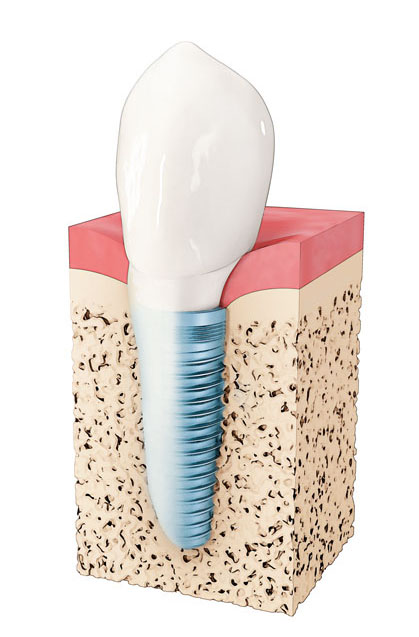When you lose your teeth, every aspect of your life is affected. Replacing those missing teeth is essential for restoring the functions of your mouth, your smile, and your quality of life. There are several options available for replacing missing teeth, but one of the most popular ones today is dental implants. Using a surgical procedure, small titanium rods are implanted into the jawbone. As you heal, the bone fuses to the implants, a process known as osseointegration. Once you have healed, ceramic crowns are placed on top, replacing the visible portions of your missing teeth. At Reno-Tahoe Oral Surgery & Dental Implant Center we can help you to determine whether this revolutionary treatment is right for you.

Are You Missing Teeth?
Dental implants are designed to replace missing teeth. If you are missing at least one tooth, implants may be an option for you. Implants are a customizable treatment, able to be used to replace one tooth or an entire arch. We adjust the number of implants needed in your jaw based on the number of missing teeth and the condition of your jawbone. Implants may also be discussed as an option if you are not yet missing teeth, but need to have a tooth extracted.
How Old Are You?
Many tooth loss patients often believe that they are too old to undergo treatment with dental implants. You are never too old to regain proper function of your mouth, your smile, and your life. No matter if you are 30, 50, or 70, implants can be a reality, provided you meet other criteria. However, you can be too young for implants. The jawbone develops through childhood and the teen years. It does not stop developing until the late teens and even early 20s. Placing an implant into an immature jaw can lead to serious developmental issues. If your child has lost an adult tooth before the jaw has finished developing, other options will be discussed. Implants can be considered after the jaw has finished growing.
Are You Healthy?
Dental implants require a surgical procedure that requires a lengthy recovery period. To recover properly, and avoid surgery-related complications, you must be good overall health. Any oral health issues, such as gum disease, will need to be treated before surgery. Any chronic conditions that you may have must be under control. Even if you are healthy, but feel ill approaching your surgery, it is important to call as your appointment may need to be rescheduled.
Do You Smoke?
Smoking has several adverse health effects, including slowing healing. The chemicals in cigarettes slow blood flow and limit the amount of oxygen in the bloodstream. When your healing is slowed, your risk of developing an infection greatly increases. To be considered a candidate for implants, you will need to be willing to quit smoking, if not for good, at least for the duration of your procedure and your recovery.
How Much Bone Mass Have You Lost?
Dental implants rely on a process called osseointegration. In this process, the bone fuses to the implants, turning them into stable roots for your replacement crowns. However, for fusion to be successful, you first need to have sufficient bone mass. However, when you lose your teeth, the bone begins to weaken. The longer you wait for dental implants, the more bone mass is lost. Too little bone loss increases the risk of implant failure. However, just because your jawbone is too weak, that does not automatically mean implants are impossible. There are options such as the All-on-4 treatment concept or a bone graft.
Dental implants provide a strong, stable, replacement for missing teeth, giving you back the functions of your mouth, your smile, and your quality of life.
Please call us today at (775) 368-8221 or click on the button below to schedule an appointment








